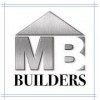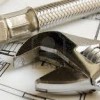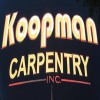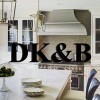
Handi-Treads are your permanent solution to slip and fall hazards. The aluminum safety treads are designed for both indoor and outdoor use and can be easily installed on virtually any surface, or architectural structure. Handi Ramp stair treads are manufactured in the USA, and are machined from rust-proof, light-weight aluminum that require no maintenance, or special care when removing snow or dirt. The metal construction of the Handi Ramp stair treads ensures that they will last for years, with a performance backed by a lifetime warranty in residential applications, and a limited warranty in commercial applications.
Home may be where the heart is, but it's also the location of the majority of slip-and-fall accidents. In this section we touch on the two rooms of the home where 63% of the slip-and-fall accidents occur - the bathroom and kitchen. We also provide thoughts on both preventing and mitigating accidents in other parts of the home including basements, hallways and garages. The combination of water, grease and lots of activity make the kitchen a space in the home where slips and falls often occur. The type of flooring that you have in your kitchen can go a long way to determining the potential for accidents.
Our bathrooms contain a unique combination of hazards which make them the most hazardous rooms in our homes. Water and other slippery liquids are being used on slippery surfaces like tile and natural stone. Bathmats, bathtubs, and towels act as tripping hazards in a small confined space. Together, these hazards mean that bathroom injuries result in over two hundred thousand emergency room visits a year. In fact, you are about four times more likely to be injured when getting out of the shower as getting in!
Concrete is a ubiquitous building material in both commercial and residential structures. Whether used for stairs running up to a loading ramp or to the front porch of your home, concrete is a strong, durable, economical structural material. Concrete is a composite material that contains sand, gravel and rock that is suspended in a fluid layer of cement that chemically hardens over time. When used for walkways, slabs or driveways, bare concrete has a good level of traction when dry or wet. Like all surfaces, however, snow and ice make even bare concrete a slip-and-fall hazard.
Ceramic tile is an economical way to add beauty to a bathroom, kitchen, or utility room in your home or office. Available in a broad range of colors, styles and textures, ceramic tile is easy to install and maintain. When used as a floor covering, ceramic tile can be quite slippery, especially when wet. Choosing a tile that has texture can certainly help, but because tile sheds water it tends to be used in wet environments. Fortunately, there are a number of ways to make tile safer when wet. First, in commercial kitchens and utility rooms, heavy rubber mats can make the normally wet areas below sinks or work areas much safer.
Porches and porch stairs can be slip-and-fall hazards because of their exposure to all of the weather elements. Rain, dew, snow and ice, or even the first frost can make the porch landing and porch steps very slippery. If your porch is in the shade, not only is the sun blocked from melting a morning frost or dew, but also the damp, sunless environment can create the perfect conditions for moss, mildew and even mold to grow. These natural organisms can make for treacherous footing. Often porches are painted, and that can make them prone to slips and falls.
Kitchens are, if you'll pardon the pun, are ripe for slips, trips and falls. The combination of water, grease and food prep items on the floor can turn a dry floor into a skating rink. When you add sharp utensils, hot stoves, and countertops filled with bowls and utensils, the potential danger from slips and trips is heightened. Our kitchen floorplan graphic highlights areas in and around the kitchen where slips and falls are most common. Cooking takes a lot of movement. That's why kitchen designers attempt to keep the sink, refrigerator and stove within a convenient triangle.
Slips, trips and falls can occur just about on any structure in your home (well, maybe on the walls or ceilings), but certain structures do tend to increase your risk of a fall. In this section of the website we examine some specific architectural constructs that tend to be places where we slip and fall. Ascending or descending stairs was responsible in 2013 for over 1.3 million injuries that required an emergency room visit, according to a 2013 US consumer Product Safety Commission Report. In fact, nearly 15% of all fall-related injuries are the result of accidents that happen on the stairs.
"These work! I only wish I found them earlier!" - Todd
Handi-Treads aluminum non-slip treads are proven to make slippery outdoor stairs safer in all weather conditions. But buyers often wonder, “how do I choose the right size Handi-Tread?” Given the wide variety of stairs and Handi-Tread lengths, it may be difficult to know which size is best for your...
Tile, all types of marble, granite, wooden, and laminate flooring can be a safety hazard. Learn how you can make them safer while while still appreciating the esthetics of your floors or stairs here: http://ow.ly/ aylL50Ci6HO
Handi-Treads are perfect for high traffic paths where water, ice, or snow can create a danger of slipping. The raised button feature helps to increase grip. Learn more about our high-quality treads at handitreads.com
Similar Businesses







